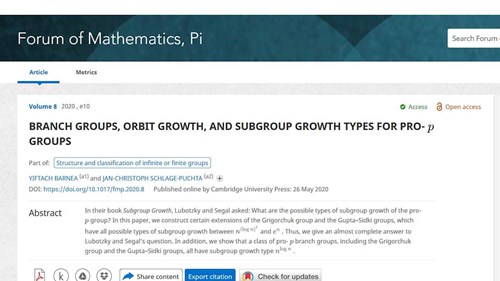Dr. Barnea and Prof. Schlage-Puchta (University of Rostock, Germany) solve a well-known open problem in Group Theory.

A result of seven years of collaboration between Dr. Barnea and Prof. Schlage-Puchta has led to a publication in one of the most prestigious mathematics journals "Forum of Mathematics, Pi".
In the paper, the authors solve a well-known open problem in the field of Group Theory. A group is an abstract algebraic way to describe symmetries. In essence, Dr. Barnea and Prof. Schlage-Puchta show that some type of groups (pro-p groups) can have almost any possible ‘size’ (subgroup growth).
A pro-p group is a type of group which can be constructed from a particular type of finite groups (finite p-groups, these are groups of size a power of a prime). A subgroup is a group that is a subset of a larger group. It's index is a number that measures in some sense how close it is to the larger group. Given a group G, let s(n) be the number of subgroups of G of index n. Subgroup growth is the asymptotic behaviour of the sequence (s(n)) when n goes to infinity. A fast subgroup growth means the group is in some sense ‘large’, while a slow subgroup growth means it is ‘small’.

Dr. Barnea and Prof. Schlage-Puchta proved that almost any subgroup growth can be achieved for pro-p groups. This natural problem was formulated by Lubotzky and Segal in their 2003 award winning book ‘Subgroup Growth’, where they highlighted the problem as particularly interesting. Dr. Barnea's and Prof. Schlage-Puchta's argument uses geometric ideas involving symmetries of certain graphs called trees (a graph without loops).
The paper, “Branch Groups, Orbit Growth, and Subgroup Growth Types for Pro-p Groups”, was recently published in "Forum of Mathematics, Pi", which is an open access mathematics journal. An open access journal is a journal in which rather than charging readers for reading the papers the journal charges authors for publishing in the journal. This increases the access of researchers from developing countries to cutting edge research.
"Forum of Mathematics, Pi" is a relatively new journal that in a very short time became one of the leading journals in pure mathematics. Indeed, in recent years it has been ranked consistently in the top five pure mathematics journals in terms of citations. This is an encouraging news to those supporting open access journals.
























